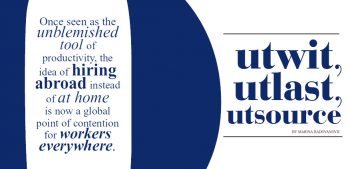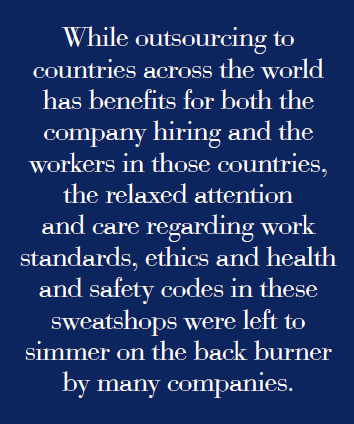
Hiring abroad is common practice worldwide and it comes in various forms. One of the most common and recognizable terms is “outsourcing” which is contracting work to other companies that either fulfill the order or subcontract it out. This is often seen with garment factories and call centres. There are two form of outsourcing: onshore, which involves obtaining work from another company located in the same country, and offshore, which involves obtaining work from another company in another country. Then there are various worker programs which include the Foreign Labour Certification Program in the U.S., the Foreign Worker Program in the U.K. and the Temporary Foreign Worker Program in Canada, in this case. These foreign labour programs focus on bringing in foreign workers from another country on a temporary basis.
Bringing in Foreign Workers
The Temporary Foreign Worker Program was developed in Canada in the early 1970s to help struggling companies that couldn’t find skilled workers or sometimes even people that were interested in the positions, fill jobs on a temporary basis. The program allowed companies to hire people from another province, or even another country. By doing so, the company could continue to function and avoid closure
or bankruptcy.
The program was accepted and was only to be utilized if a company had no other way of filling their staff needs for specific jobs. However, over the years, it expanded and was used more frequently in order to save money and avoid fringe benefits.
Workers in countries where employment was low and the population high welcomed the system that helped them provide food and shelter for their families and hope for a better future. It all seemed to be working out until negative factors started making international headlines.
In Saudi Arabia, problems have surfaced as unregulated contractors in the construction field amount to approximately 70 per cent. This has posed difficulties for the government as they are faced with poor construction work and dangerous situations (Courtesy of Arab News, Riyadh, October 24, 2013). Fahd Al-Hammadi, chairman of the National Committee for Contractors of the Council of Saudi Chambers, adds that smaller scale construction businesses should be recognized and the unregulated contractors should be removed from the market. Despite a higher cost to the citizens, it would deem favourable and safer.
But the younger generation in Saudi Arabia are opting for higher paid positions that match their education and skills, causing a dearth of trade workers available to fill the high number of jobs available in the trade sector due to the country’s robust construction scene. So looking abroad fills that need. Young graduates are reluctant to work in the construction trade because of the difficult working conditions while experienced and aging construction professionals are incapable of yielding to the demands.
This ongoing dilemma is not only facing North America and the Middle East but also many European countries, where young graduates are looking at higher paying white collar jobs to match their education leaving the construction industries who need workers too look abroad for new hires. It is not uncommon, in certain parts of Europe, to not be able to find a professional contractor and citizens are forced to accept whatever type of contractor they can find in order to develop and maintain buildings, homes and at times, infrastructure. Thereby calling into question quality control and safety issues.
In Canada, in 2012, scandal broke that the Royal Bank of Canada was subcontracting work to an offshoring firm which was using temporary foreign workers to replace some of the bank’s full-time Canadian staff. In an open letter to Canadians, RBC president and CEO Gordon Nixon said that RBC was “compliant with regulations” for outsourcing Canadian jobs but that the bank failed to meet “everyone’s expectations.” He apologized to the displaced Canadian workers and pledged that they are “preparing a new initiative aimed at helping young people gain an important first work experience in our company.”
Other banks were not exempted from the attack. In fact, Bank of Montreal also came under fire and BMO president and CEO Bill Downe said that BMO has used the controversial Temporary Foreign Worker Program to fill short-term gaps.
Further reports disclosed that there are over 300,000 temporary foreign workers in Canada and they are not really temporary. Companies hiring foreign workers are in the health care industry, the restaurant business and various other sectors. One high profile incident that involved a lawsuit and a government investigation was the British Columbia mining incident, where miners complained they were being replaced by foreign workers brought from China. The unions initiated lawsuits and angry letters and complaints were sent to the provincial government. The claims insisted that the government was not helping citizens that were unemployed, in dire need of work, qualified and eager for employment. The B.C. mining scandal became a hot topic and the pressure from disgruntled citizens led the federal government to announced a review of the entire Foreign Temporary Worker Program. The provincial government claimed it would investigate the recruiters in China that were seeking money for the placement of work according to the outsourcing program. On the flipside, last year the Chinese mining firm’s union launched an attack aimed at Ottawa involving legal action based on discrimination.
Temporary foreign workers are not the only foreigners replacing company staff. For years many top-notch and well-known manufacturers have been outsourcing work to outside suppliers in foreign countries.
Contracting Work Out – Outsourcing
Outsourcing (offshore and onshore) hires external employees or companies to perform duties usually carried out by internal staff. Companies that outsource usually provide minimum wage and offer no fringe benefits; thereby reducing their costs while increasing their profits. While cheaper labour is obtained which in turn provides cheaper merchandise to the public, unemployment rises. And while more jobs become available in poorer nations they often come with poor working conditions and sometimes even dangerous ones. While outsourcing to countries across the world has benefits for both the company hiring and the workers in those countries, the relaxed attention and care regarding work standards, ethics and health and safety codes in these sweatshops were left to simmer on the back burner by many companies.
While corporations continue to outsource because it has become innate to their financial success, the outpour of compassion and sympathy that arose when the manufacturing building collapsed in Bangladesh put scrutiny on outsourcing. Many corporations came under attack, but most notable was Joe Fresh owned by Loblaw. Thousands of lives were lost when the building, which had not been inspected for safety, collapsed. When Joe Fresh came under fire other companies outsourcing to Bangladesh were also exposed. Loblaw continues to provide employment in Bangladesh, but now routinely inspects the safety of the structure by sending Canadian representatives to monitor the building that manufactures its products
When the tragedy occurred the word “transparency” was being thrown around, throughout the west in particular. As noted in The Toronto Star many fashion industries, among other manufacturers, had little or no knowledge that their work was being outsourced from Bangladesh to other locations.
Because of the demands of the continuous change of marketable items and fashion trends, the higher wages demanded by staff, and unions and possible fringe benefits that the law requires or deems necessary in their own land, companies found that the best way to achieve a substantial and profitable income was by outsourcing.
Appeals to governments in the West are highlighting the negative aspects of outsourcing — high unemployment rates, the rise of cost of living expenses, lawsuits and the 1,129 known fatalities and approximately 2,515 injured when the Rana Plaza commercial building collapsed in Bangladesh.
There are obviously many benefits to hiring abroad for companies facing closure, or that have limited budgets that make it difficult for them to hire within their own countries, or that simply can’t find people interested in the work they have to offer. But whether certain companies and businesses were actually forced to use hiring abroad as a last resort is questionable. There are definite pros and cons to this controversy and hopefully companies are taking greater measures to ensure the safety of the employees, as well as be more aware of the level of wages and benefits that are being extended to the employees by the company or subcontractor.
BY MARINA RADOVANOVIC


















































































































